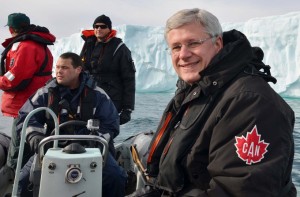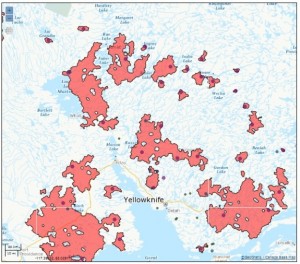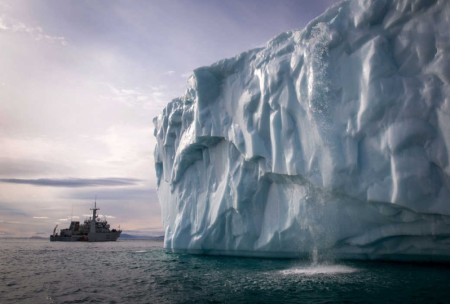Arctic tour puts unintended spotlight on climate change

This August, Stephen Harper became the first Canadian Prime Minister to travel the Northwest Passage. Photo: Prime Minister’s Office
For 9 years running, Canadian Prime Minister Stephen Harper has spent part of his summers touring Canada’s Arctic regions, including this year’s Operation Nanook 14.
He goes to wave the flag and bolster territorial claims in the area. He goes in anticipation of a coming boom once resources and shipping are more accessible. And many think he goes from a genuine respect for the history and potential of the far north.
On tour, or back in Ottawa, what Canada’s most important political figure seldom discusses is a little thing called climate change. Which is odd, considering how the Arctic absolutely, utterly proves that something big is happening to our planet.
Particularly in the U.S., one can still get arguments about the cause of receding glaciers, changes in sea ice, and shifts in weather, animal and plant life. But in the Arctic, it’s virtually impossible to deny major changes are happening, often even faster than initially predicted.
Residents there know that first-hand. The Arctic Rangers, a mostly-indigenous civilian reservist force that patrols the region, say nearly everything is changing. As reported by the Canadian Press:
“The elders used to be able to predict the weather by looking at the clouds; they can’t do that anymore. You can’t predict the weather anymore,” was a typical comment on the impact of climate change, which has reduced snow cover, led to earlier springs and generated fiercer winter winds.
Snowmobiles are becoming less available as the snow disappears, making it harder to travel.
“We never used to have forest fires. Now we have more and more each summer,” said one participant.
“There are new species now like small birds, ducks, salmon, foxes, grizzlies and an unknown species that is a cross between a polar bear and a grizzly,” said another. “We never used to see any of these species before.”
Meanwhile, staples of the indigenous northern diet — caribou, seal and polar bear — are migrating north to escape the warmer weather, leaving fewer animals to hunt.
“Polar bears used to be fat and tasty,” said one ranger. “They taste different now.”
And the Arctic is no longer a natural refrigerator for the hunt, said some.
“When we are on the land and living in tents, we dig holes to put the carcasses in to keep them frozen. Now even six feet down it is not frozen.”

Natural Resources Canada map of estimated burn sites near Yellowknife NWT, toward the end of the 2014 fire season.
CBC news reports the fire season has been unusually bad in the Northwest Territories this year:
The worst forest fire season in decades has ravaged about 33,000 square kilometres of land — an area larger than the size of Vancouver Island.
Most of the destruction has been in the North Slave region, where Alfred Arrowmaker hunts and traps.
“I went out weeks ago, looking for moose, and there was nothing there. Everything is burned. There is absolutely nothing out there,” Arrowmaker says.
“I have lived in Gameti my whole life, and I have never seen this kind of fire in my life before.
Micheal Den Tandt traveled with Prime Minister Harper’s entourage for Postmedia News. Summarizing the tour, Den Tandt said it went very well, on the whole. With two glaring exceptions.
Problem one is improving the many frustrations and poor conditions still faced by Canada’s indigenous populations. And, as Den Tandt put it,
The second elephant in the room is, of course, climate change. In the Arctic this is neither debate nor symbol; it is a fact on the ground. Moreover, it’s one the government clearly recognizes, at least in deed. The opening of northern sea routes now in its infancy underpins virtually every aspect of the Harper government’s Arctic strategy, from the search for the Franklin ships, to the need to project sovereignty northward, to the military’s Operation Nanook on Tuesday, which envisioned a tourist ship running aground in York Sound, near the Davis Strait.
None of this would be happening were it not for the gradual withdrawal of the summer ice. Climate change is a fundamental to the emerging geography of the Canadian Arctic. And yet, the two words “climate change” were not uttered a single time over the span of six days, by the PM or any of his ministers, that I am aware of. At this late juncture, with the Arctic so central to their plans, that is simply astonishing.
Readers who are still with me are probably interested in the Arctic as a region. So I wanted to call attention to a fascinating article in the New York Times on the mystery of what happened to the Dorset, an Arctic people who survived well in isolation for 4,000 years before vanishing about 700 years ago.
The article concerns a new study published in Science Magazine this August “The genetic prehistory of the New World Arctic” which examined DNA evidence to conclude the Dorset were not absorbed into surviving populations.
Researchers feel the Dorset likely had problems caused by their too-isolated gene pool. But the coup de grâce may have been environmental, according to New York University professor Todd R. Disotell (who was not part of the DNA study):
Another possibility, Dr. Disotell explained, is that the Dorset braved generations of harsh tundra conditions only to succumb to the effects of climate change. In the Arctic, even minor shifts in temperature can devastate marine life, cutting off vital food sources. The archaeological record, in fact, suggests that several such events had nearly wiped out the Paleo-Eskimos before.
“When you’re dealing with sea ice, just a few degrees can be transformative,” Dr. Disotell said. “Three bad winters in a row where you can’t hunt seals, and you’re in trouble.”
Of course, some will seize upon the fact that climate has changed – dramatically – long before humans were burning carbon counts as another challenge to today’s understanding of global warming and its causes.
But maybe the salient point is this: climate change matters. Argue all you like about what causes it. Just admit that some of these shifts become issues of survival.

A striking image from the Prime Minister’s 2014 Arctic tour. Photo: PMO
Tags: Arctic, canada, climate change, Dorset, economics, environment, history, Inuit, Prime Minister Stephen Harper, science








Harper here’s no evil, speaks no evil, nor sees no evil. Too bad really cause all he would have to do is is listen to the reflection he see in the mirror speak. save Canada, vote Harper out of office!!!
Facts – It is currently -99 F in Antarctica. Arctic ice cover is the greatest since 2006 – no Northwest Passage. High temps in the far north are back into the 30’s and snow is starting.
I fully expect another winter with below average temps. Key word is average. There is no such thing as normal when it comes to either climate or weather. There are only averages.
The most abnormal thing in weather/climate would be a day, month or year with only average temps, snow and rain.
And by the way, the next ice age will cause more problems for humans than any global warming.
“I have lived in Gameti my whole life, and I have never seen this kind of fire in my life before.” I love these quotes the guys like 60 years old. Not even a blink of an eye in the earths 5 billion years. Yet they blame man made global warming (climate change is now used because the earth is not warming. Had to reset the terms of their lie) that has happened 10,000 times in the past 5 billion years. A world filled with fools that have to be worried about something to show value to their lives. http://stevengoddard.wordpress.com/2014/08/30/more-evidence-that-time-began-in-1979/
Lucy, I applaud your article as a start along the lines of the Chinese proverb “A long march starts from the very first step”. Hopefully you will keep on keeping on and continue to write about this very very important subject; global warming and the climatic changes it is responsible for.
It does amuse me that the very folks who claim that their demand that “the American way of life” be non negotiable arises from their desires to ensure that their children, grand children, great grand children, great great grand children, ., ., , ., great^nth grand children will have everything they need for a long, prosperous and happy life despite the preponderance of evidence that these self same folks are deluding themselves into a “belief” that burning every ton of coal, barrel of oil and cubic foot of natural gas is absolutely necessary for their very own long, prosperous and happy lives at this instant in time; while ignoring and denying the obvious damage to the Earth’s flora and fauna as a direct result of the greenhouse gas byproducts of this combustion. These folks expose themselves as having minimal scientific comprehension/understanding and a preference for magical/religious belief systems with their blind faith in proclamations promulgated by the uber rich whose ulterior motives, to garner as large a share of the economic value of marketing fossil fuels for as long as possible, are patently obvious. Blindly following the pronunciations of those with vested interests reminds me of another Chinese proverb: “He who asks a question is a fool for five minutes; he who does not ask a question remains a fool forever.”
Locally we have those who proclaim opinions such as:
Do you know there has been no increase in global temperatures in 17 years?
The public wants oil. People want to drive cars, motorcycles, boats, etc. They want to fly places in airplanes.
Lets get the politics out of energy and the capitalist system in. Then it will grow.
Incidentally, the science says the climate is pretty darn stable all things considered.
Or maybe McKibben is a Climate Change Pause denier?
I’m against anything McKibben is for.
This is most definitely a real problem. Bill, what is the solution please?
Good article.
Its fascinating. One wonders if these types of changes were happening anywhere else, besides a place that has a very low population density and that population is also often Native; that there would not be a huge outcry and panic.
The thing I don’t understand is why people are still investing in the coastlines? Why is the most expensive real estate in the world located right next to our oceans? You will know when people REALLY believe in climate change when that real estate plummets in value.
Pete, Antarctica is just coming out of winter, so -99 is not unusual. The record is around -130 F. The Arctic sea ice was not as thin as in some recent years, but it was still well below average. These facts are pretty easy to track down.
As is this fact: we are changing the climate by pouring heat-trapping gases into it at an unprecedented rate.
Is there any other topic where you believe that you understand the facts better than the men and women who devote their lives to it? Do you dismiss your doctor’s expertise when he or she explains the test results to you? Are you skeptical that we have sent probes to Mars because you, personally, did not make the calculations? Have you taken the time to verify that the human genome has been recorded correctly?
Thousands (yes, thousands) of scientists are seeing indications of climate change in their areas of study. You can read their work in any good science journal. If you aren’t interested, fine, but posting “facts” from your favorite website doesn’t add anything to the discussion.
I am not denying climate change or the damage of putting so much carbon and particulates in the air. What happens when we are just correlating upward temperature change over the passage of time is that there is no way the link is that direct. Right now we are in a climate pause, that is pretty well established. Why? We really don’t know, its very very complex. Thus if we say well temperatures are going to march up by Y based on X amount of CO2 released, we are in trouble because we don’t know how to do that; we don’t understand everything that is going on and it does not help to reach in an effort to confront those who deny everything. Certainly the Arctic is changing radically, the antarctic not nearly as much, once again, why?
We would be a healthier planet to reduce carbon, but until we have a better handle on what is going on its hard to make a case about what exactly to do when it comes to policy decisions that impact the everyday lives of individuals.
No, we are not in a climate pause. The trend over the past 50 years is towards higher average temperatures. Using a subset of the data for, say, the past 10 or 15 years can be misleading. If you start your data range at 1997, we see the averages continue to rise, but at a slightly slower pace (between 5% and 10%) than predicted. This is a very interesting problem for climate modelers, but of no real significance to the rest of us.
That said, you are entirely correct that we have really no way to predict what the effects of climate change are going to be season to season and place to place. We will have rainier seasons and drier seasons, hotter and cooler summers. (It seems pretty likely that we will continue the trend of higher minimum winter temps in the North Country, which is where you would guess that the effect of climate change is most apparent.)
The only true thing that we know is that adding more and more heat-trapping gases to the atmosphere will result in greater and greater climate disruption. What that disruption will look like, only time will tell.
How much more will cause disruption?
Because what we are going to see is that those types of questions have to be answered before we force people to make the sacrifices necessary. We also have to be clear that as usual, the main people in the US that will end up paying for reducing carbon emissions will be middle and lower middle class working Americans who will be laid off or have to pay higher energy bills they cannot afford. If you are going to ask for that sacrifice from them we better be able to tell them exactly what the benefits will be and when it will occur?
http://www.nytimes.com/2014/09/09/business/an-energy-boom-lifts-the-heartland.html?hp&action=click&pgtype=Homepage&version=LedeSum&module=first-column-region®ion=top-news&WT.nav=top-news
Also lets say that we reduce carbon in a real way (not just yak about it at conferences like the countries that signed Kyoto have done while increasing their carbon output faster than the US), and the other major carbon producers do nothing? Would we make a difference and would we lose competitive advantage in the world economy?